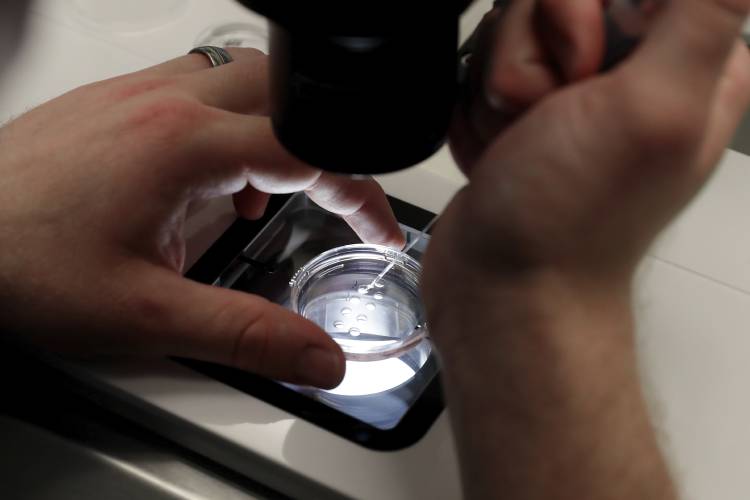Opinion: Alabama’s anti-abortion movement has collided with itself

Lab staff prepare small petri dishes, each holding several 1-7 day old embryos, for cells to be extracted from each embryo to test for viability Feb. 27, in Houston. Michael Wyke/ AP
| Published: 03-12-2024 6:00 AM |
Oge Young, MD, is past president of NHMS and member of the general council representing New Hampshire obstetricians for 20 years.
The Alabama Supreme Court ruled in February that embryos created through in vitro fertilization (IVF) are children. The extraordinary decision determined that the in vitro 8-cell microscopic embryo is a person. This opinion read more like scripture than law:
“We believe that each human being from the moment of conception, is made in the image of God, created by Him to reflect His likeness…Carving out an exception would be unacceptable to the People of this State, who have required us to treat every human being in accordance with the fear of a holy God who made them in His image.”
There was only one dissent among nine Alabama State Supreme Court justices. Since the reversal of Roe v. Wade in June 2022, there has been a strict ban on abortion in Alabama threatening providers of women’s reproductive healthcare with civil and criminal penalties.
Several of Alabama’s IVF clinics (including one at the University Hospital in Birmingham) have temporarily closed since the Supreme Court ruling. These clinics are concerned over the legal consequences of aborting embryos given their personhood status. When frozen embryos are thawed, there is a possibility that they may be damaged or destroyed. In these cases, would a lab technician be responsible for an illegal abortion?
About half of IVF cycles involve pre-implantation genetic testing of the embryos. Couples seek this option when one of them is a carrier of a genetic mutation that is associated with a serious disease or condition. IVF specialists fear they would no longer be able to discard these abnormal embryos under Alabama law without legal peril.
The plaintiffs in this Alabama lawsuit are three couples, who all underwent IVF treatments, achieved a pregnancy and have had healthy children. As with most IVF cycles, these couples each produced additional embryos which were cryopreserved in tanks at sub-zero temperatures. These frozen embryos are saved and are available for subsequent pregnancies should the couples choose to have another child.
Unfortunately, in December of 2020, a patient broke into their hospital’s fertility clinic and opened one of the cryopreservation tanks destroying the plaintiffs’ frozen embryos. The couples brought suit against the hospital and clinic for the wrongful death of a minor which is an Alabama statute. At a lower court trial, the case was dismissed. The trial judge stated that embryos in vitro are not children or people.
Article continues after...
Yesterday's Most Read Articles
 New Hampshire targets sexual exploitation and human trafficking inside massage parlors
New Hampshire targets sexual exploitation and human trafficking inside massage parlors
 New Hampshire legalizes public alcohol consumption in designated ‘social districts’
New Hampshire legalizes public alcohol consumption in designated ‘social districts’
 State rules Epsom must pay open-enrollment tuition to other school districts, despite its refraining from the program
State rules Epsom must pay open-enrollment tuition to other school districts, despite its refraining from the program
 ‘A little piece of everything I like’: New Pittsfield barbershop brings more than a haircut to downtown
‘A little piece of everything I like’: New Pittsfield barbershop brings more than a haircut to downtown
 Remembered: Friends recall stories about the lives of those who died without housing
Remembered: Friends recall stories about the lives of those who died without housing
 Town turmoil: Chichester town administrator resigns again
Town turmoil: Chichester town administrator resigns again
The couples appealed that decision to the Supreme Court of Alabama which disagreed with the lower court, finding that the wrongful death of a minor did apply, “to all unborn children without limitation, including unborn children who are not in utero at the time they are killed.” This decision has given rise to a real dilemma for the “pro-life folks” of Alabama. IVF is a procedure that is used to create life, to create pregnancy, so one could argue it is pro-life medical technology.
The Alabama anti-abortion movement is finding that it has collided with itself. The same abortion law which bans the termination of any pregnancy at any stage is also terminating IVF, the remarkable medical procedures that create a pregnancy and new life.







 Opinion: Trumpism in a dying democracy
Opinion: Trumpism in a dying democracy Opinion: What Coolidge’s century-old decision can teach us today
Opinion: What Coolidge’s century-old decision can teach us today Opinion: The art of diplomacy
Opinion: The art of diplomacy Opinion: After Roe: Three years of resistance, care and community
Opinion: After Roe: Three years of resistance, care and community
